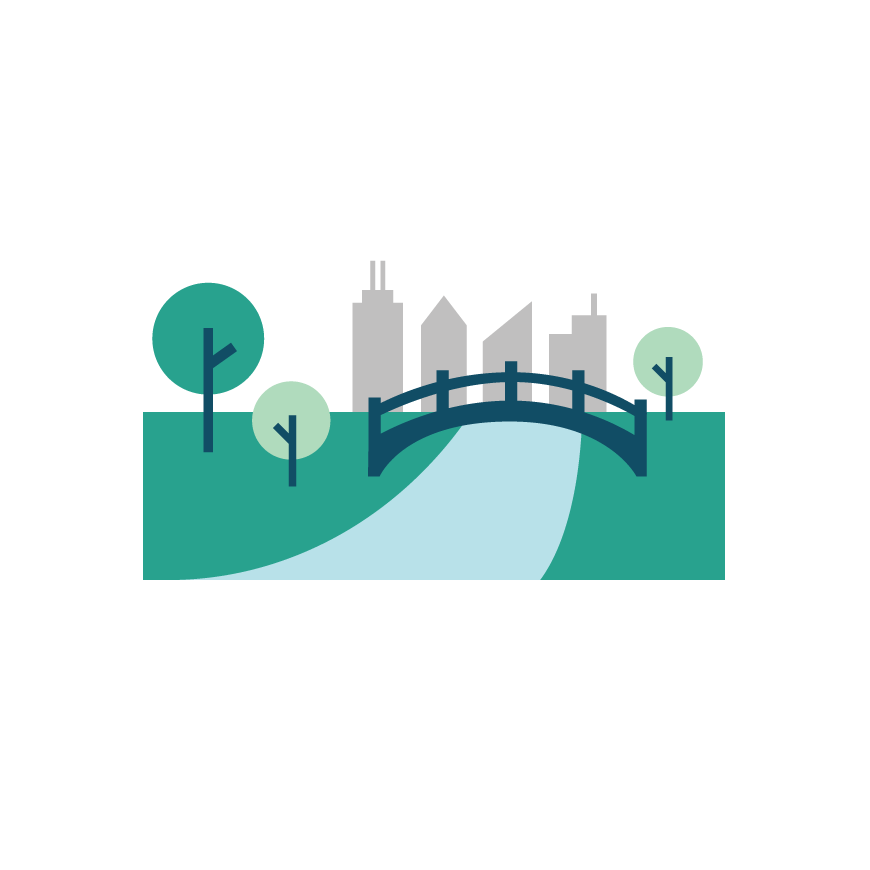
“The trees act not as individuals, but somehow as a collective. What happens to one happens to us all. We can starve together or feast together.”
Photo credit: Space to Grow
About RxN
With a wealth of regional biodiversity and natural gems such as Lake Michigan, parks, forest preserves, and community gardens, it’s no wonder that Chicago is a “City in a Garden.” Since the city’s very founding, nature has been an integral part of its heritage.
Unfortunately, access to nature and green space has not been evenly distributed. Today’s Chicago communities reflect decades of institutional racism and urban development that have disrupted the natural environment rather than enhance it. The result is a range of social and environmental challenges, which continue to disproportionately impact low-income residents and people of color. These include urban flooding, poor air quality, urban heat island effect, inequitable food access, and numerous social determinants of health.
Resilient by Nature Project (RxN) aims to chart a new path forward. Our goal is to expand the role of nature in our neighborhoods to improve health and quality of life, provide economic opportunities, and build resilience to the impacts of climate change.
While our work is focused in the Chicago region, we are continuously learning and taking guidance from the many examples of nature-based solutions around the world.
Together, we look forward to building a more sustainable, equitable and vibrant Chicago.

How does RxN define nature-based solutions?
RxN defines nature-based solutions (NBS) as “employing nature at a meaningful scale for multiple benefits.” They are approaches to community improvement that benefit both people and nature.
Employing nature
To employ nature is to modify, enhance, or restore an ecosystem. It could mean planting special vegetation or changing the topographical and hydrological features of a landscape.
Meaningful scale
Scale is defined as relative to the desired benefit and to the challenge that the project seeks to address, from pocket parks and green roofs to landscapes.
Multiple benefits
Benefits such as economic, social, and environmental outcomes that improve human well-being and biodiversity.

Our areas of focus
Through targeted research efforts involving diverse communities throughout Chicago, RxN has identified the following four key areas of focus:
Catalytic Projects
Support impactful, on-the-ground projects that use nature-based solutions to benefit people, communities, and the environment.
Critical Data
Build a shared understanding of Chicago’s existing NBS assets and opportunities for growth, fill crucial data gaps, and build the evidence base for NBS in Chicago.
Education and Leadership
Engage a wide range of stakeholders to examine nature-based solutions and how they can benefit the Chicago region. Target audiences might include municipal leaders, community leaders, planners, and the general public.
Convene and Collaborate
RxN supports a collaborative community of practitioners through events, webinars, and joint research and advocacy efforts.
Who We Are
RxN is spearheaded by Walder Foundation, a private family foundation based in Skokie, IL. Among its funding interests, the Foundation’s environmental sustainability program aims to make the Chicago region more livable and resilient for future generations by integrating nature into our everyday lives.
RxN Contacts
Jack Westood
Walder Foundation
Program Director, Environmental Sustainability environment@walderfoundation.org
Casey Sebetto
Walder Foundation
Associate Program Officer, Environmental Sustainability
environment@walderfoundation.org

How we developed the RxN Project (RxN)
We began RxN by gathering input from NBS practitioners, stakeholders, and relevant literature. We formed an advisory committee, conducted individual interviews, hosted a town hall session, and issued an open call for ideas. We researched projects specific to the pursuit and implementation of NBS, as well as relevant projects from related or intersecting fields such as public health and community development. This research culminated in a recommended strategy for RxN (our focus areas), as well as a framework to coordinate a community of practice, develop and support new projects, and identify future opportunities for nature-based solutions.
Advisory Committee
RxN was developed with input from an advisory committee comprised of diverse and relevant experts and practitioners from the Chicago region. We thank them for their participation and support:
Jerry Adelmann
President & CEO, Openlands
Michelle Carr
Illinois State Director, The Nature Conservancy (TNC)
Paula Conolly Director
Green Infrastructure Leadership Exchange (GILE)
Robert Dean
CEO, Center for Neighborhood Technology (CNT)
Ghian Foreman
President & CEO Emerald South Economic Development Collaborative
Christina Harris
Director of Land Use & Planning Metropolitan Planning Council(MPC) Antonio Lopez Senior Advisor, Little Village Environmental Justice Organization (LVEJO)
William Miller Director
Northwestern U. Center for Engineering Sustainability and Resilience
William Schleizer
Executive Director, Delta Institute
Lydia Scott
Director, Chicago Region Trees Initiative (CRTI)







